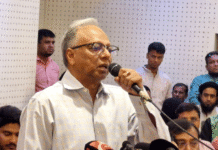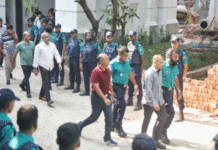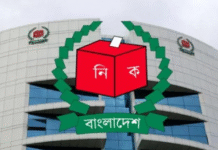Two Dhaka city mayors are still divided on many issues tied to the dengue outbreak, including what insecticides will be used to kill mosquitos, as the viral fever stalks Bangladesh.
The differences of opinion between the two mayors have appeared despite experts’ call for a quick and joint operation to kill mosquitos so that the carrier of the viral disease cannot fly from one side of the city to the other.
Dhaka South Mayor Mohammad Sayeed Khokon said he tested the insecticide even on Saturday noon. “I found that the insecticide killed 85 percent of the mosquitos,” he said, adding that there was no reason to stop spraying the insecticide which has been used for long.
Dhaka North Mayor Md Atiqul Islam, however, said his own test report yielded different results.
“I found faults with the insecticide and have banned the supplier. I have blacklisted that insecticide because I did not find it useful,” he said.
The two mayors were speaking at Toufique Imrose Khalidi LIVE hosted by bdnews24.com’s editor-in-chief at the news publisher’s studio in Dhaka on Saturday evening. bdnews24.com broadcast the programme on its Facebook page and YouTube channel besides the website.
Dengue fever which first stuck Bangladesh in 2000 took an appalling turn this year infecting about 23,000 people, and according to media reports, killing over 50.
It has spread across Bangladesh with experts apprehending that the situation can deteriorate during the upcoming Eid-ul-Azha holidays when millions of people will travel home from Dhaka, the epicentre of the outbreak.
The Health Directorate said they had forecast the situation and warned the city corporations before.
But the city authorities are still confused over the use of insecticides. The research centre, ICDDR,B, said the insecticides being used are no longer effective. They also suggested importing new agents.
But Khokon said he found the mosquitos have become resistant to permethrin, one of the ingredients accounting for just 0.2 percent of the insecticide.
A tussle started between the Local Government Division and the two city corporations over who will import new insecticides to kill mosquitos.
The High Court summoned LGRD Secretary Helal Uddin Ahmed to explain the imports of effective insecticides to kill mosquitos. It also asked the city corporations to import new agents.
Khokon said he acted on the Health Directorate’s forecast. “We have taken a crash programme. Our inspection team went door to door to kill larvae. They have visited 33,000 homes,” he said.
“We’ve also announced that we’ll penalise if we get larvae during our visits,” he said, “but honestly speaking, there has been massive reaction to that announcement. Then we stopped.”
Editor-in-Chief Khalidi asked whether Khokon stopped the initiative considering votes, the mayor did not make any direct reply, but said he was severely criticised.
Mayor Khokon played down the protest by a group demanding his resignation. “I was surprised to see only three protesters. I thought it would be 300,000. So it was intentional,” the mayor said.

KOLKATA EXPERTMayor Islam had earlier said he would bring an expert from Kolkata, the capital of India’s West Bengal, as the city has reportedly achieved success in containing dengue.
But Khokon opposed the move to take advice from the neighbouring country, pointing out that the disease has recently struck the Indian city as well.
“I am totally against it,” Khokon said. “Let them look after their own situation first.”
Islam, however, said Dhaka might still tap the experiences of Kolkata officials.
“Many good things are happening in different places across the world. We can learn from the best practices and use the information,” he said.

DEADLINEThe two mayors also differed on setting a specific deadline within which the authorities will try to control the ongoing outbreak by killing mosquitos.
Khokon stuck to his earlier comment that the situation would come under control by the first week of September, thanks to his anti-dengue plans.
But Islam would not set any deadline, emphasising the need for year-long efforts to keep the menace at bay.
Khokon also refused to blame anyone. “All agencies are now working. There is huge public engagement. People are now much aware.”
Both of them agreed on having a separate research and development wing for mosquito control.
Mayor Islam acknowledged that there are problems. “But we’re focusing on how to control it.”
“I’ve understood in four months of my experiences that our work should not be limited to the rainy season. It should continue for 365 days a year. We have to take an integrated vector management or mosquito management plan,” he said, as he mentioned short, medium and long-term strategies to fight off the menace.
“At this moment, we have to clean homes. We have to prevent water accumulation inside and around homes.”

WARNING AGAINST EXTRA PRICEMayor Islam threatened legal action against traders who were allegedly charging extra for mosquito repellents.
The demand for Odomos, a mosquito repellent cream, has risen sharply since dengue broke out. Customers have alleged the traders hiked its price manifold cashing in on the outbreak.
Khalidi, without naming any product, said a mosquito repellent was available at Rs 82 in India but prices in Bangladesh zoomed past Tk 500.
When he asked whether the authorities have any plan to act against the traders who are charging extra for these products, Mayor Islam said he would act quickly over the issue.
He promised to take steps to set the prices of these products through the commerce ministry and assign magistrates to monitor the markets.
Prices of fogging machines used by authorities to spray insecticides have also increased, he said.
“It’s like taking money at gunpoint,” he said, urging the traders to consider the issue humanely.
Source: Bdnews24.










